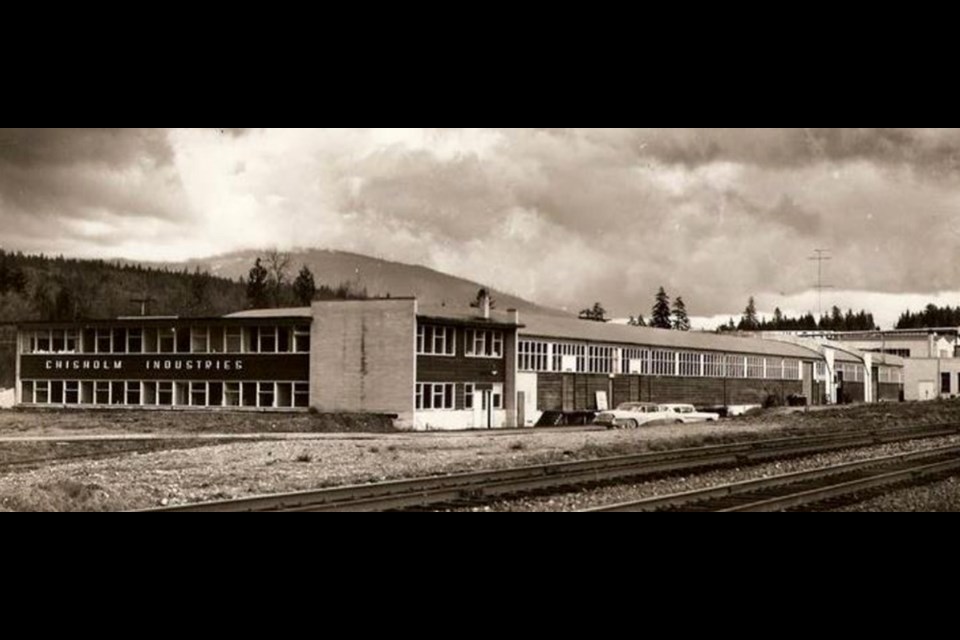The matriarch of a family that put Port Moody on the leading edge of electronics manufacturing for a decade in the 1950s and 60s has died.
Isabelle Chisholm passed away recently, at the age of 98. She was the widow of Edward Chisholm, who built a state-of-the-art manufacturing plant for radios and televisions sets in Port Moody in 1954. She was also the keeper of some of the company’s secrets.
As the chief purchasing agent for Vancouver Radio Laboratories Ltd., Isabelle Chisholm’s tasks included travelling to Ottawa to clear secret components for radio receiver sets used by the Canadian armed forces during WWII that were invented by Edward, and manufactured in his first plant, on Vancouver’s Main Street.
When the war ended, the company’s name was changed to Chisholm Industries Ltd., and it shifted production to table-top radios and phonographs as well as a fancy new technology — black-and-white televisions.
Edward Chisholm’s factory was the only such manufacturer west of Toronto, and Isabelle became the first female electronics salesperson.
“She was a dynamo of energy and conviviality who knew how to make a sale,” said Isabelle Chisholm’s obituary. “She was widely known for her ability to successfully connect with the public through telephone calls.”
In 1947, the 12,000 sq. ft. plant in Vancouver was damaged by fire, and the Chisholm’s began casting about for space to build a larger facility. They found it in Port Moody, purchasing 23 acres along Murray Street, and construction began in 1954 on a new 56,000 sq. ft. state-of-the-art factory that also contained offices, a warehouse as well as sheet metal and tool and die shops.
The new home for Chisholm Industries Ltd. opened the next year.
The sprawling main plant was 100 ft. wide and 14 ft. high. The assembly line for radios and TVs was 400 ft. long. There was a large baking oven to fuse paint to the metal surfaces and a cabinetry section to manufacture and finish the high-quality wood boxes that held the radios and TVs. All the engineering and design for products was done in-house.
At peak capacity, the plant could produce 200 units a day.
Chisholm’s products were renowned for their quality. They were sold at furniture stores like Wosks and department stores like Eatons, Woodwards, Sears and Hudson’s Bay.
But the advent of colour television changed the industry. The cost of retooling the plant for the new technology was too high, and more and more electronic goods were being engineered and constructed offshore, in countries like Japan.
By 1963, the factory floor at Chisholm Industries was mostly manufacturing wooden cabinets for other electronics companies like Bell and Packard. The following year, Edward Chisholm closed the plant, with much of its machinery going to his son, James, so he could start Glenayre Electronics in Burnaby.
The sprawling plant in Port Moody was rented to various industrial and commercial tenants, as well as artists, until it was demolished in 2010.
In 1967, Isabelle and Edward Chisholm retired to Victoria and began growing hydroponic tomatoes on an acreage they’d purchased, selling much of their produce to the Empress Hotel and Woodwards.
After Edward died in 1968, Isabelle became a successful realtor and joined boards of directors for several organizations like the PNE, ICBC, the Boys and Girls Club and the C.H.I.L.D. Foundation. She was also politically active with the Social Credit party in B.C., as well as the federal Reform, Canadian Alliance and Conservative parties.
According to her obituary, Isabelle Chisholm’s ashes will be scattered near the Royal Vancouver Yacht Club, where she and Edward were longtime members, and his ashes were also distributed.
The site of the family’s former factory in Port Moody is currently being turned into a condo complex called 50 Electronic Avenue.



